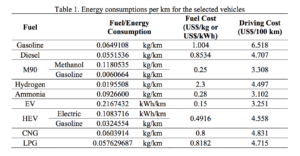Comparative Life Cycle Assessment of NH3 as a Transportation Fuel in Ontario
By Trevor Brown on October 13, 2016
A recent paper from the University of Ontario Institute of Technology, published in June 2016, provides new data on the relative efficiency and safety of using ammonia as a transportation fuel. It presents a cradle-to-grave “comparative life cycle assessment” for a range of vehicles, encompassing the vehicle cycles (manufacturing, maintenance, and disposal) and the fuel cycle (operation).
It is noteworthy that this study assumes that hydrogen and ammonia fuels, and electricity, are produced using today’s dominant technologies, primarily from fossil fuel feedstocks. Its conclusions are therefore relevant to today’s industrial systems, without any assumption of future technology improvements.

The study compares traditional and alternative fuels for internal combustion engines (ICE), including gasoline, diesel, LPG, methanol, CNG, hydrogen and ammonia, as well as electric (EV) and hybrid-electric vehicles (HEVs).
For each power source, it calculates the vehicle’s environmental impacts in the following categories: human toxicity, global warming, acidification potential, eutrophication, depletion of abiotic resources, stratospheric ozone depletion, and terrestrial ecotoxicity.
The results show that hydrogen vehicle is the most environmentally benign one in all environmental impact categories. Ammonia as a sustainable and clean fuel has lowest global warming potential after EVs and yield lower ozone layer depletion values than EVs. Although EVs do not emit direct CO2 during operation, the production and disposal processes of batteries bring some consequences which harm the environment in terms of acidification, eutrophication and human toxicity.
Comparative assessment of NH3 production and utilization in agriculture, energy and utilities, and transportation systems for Ontario
Dincer et al, June 2016
Greg Vezina, of Hydrofuel Inc, presented these and other Key Life Cycle Assessment Numbers for NH3, Green and Brown Energy at the NH3 Fuel Conference in September 2016.